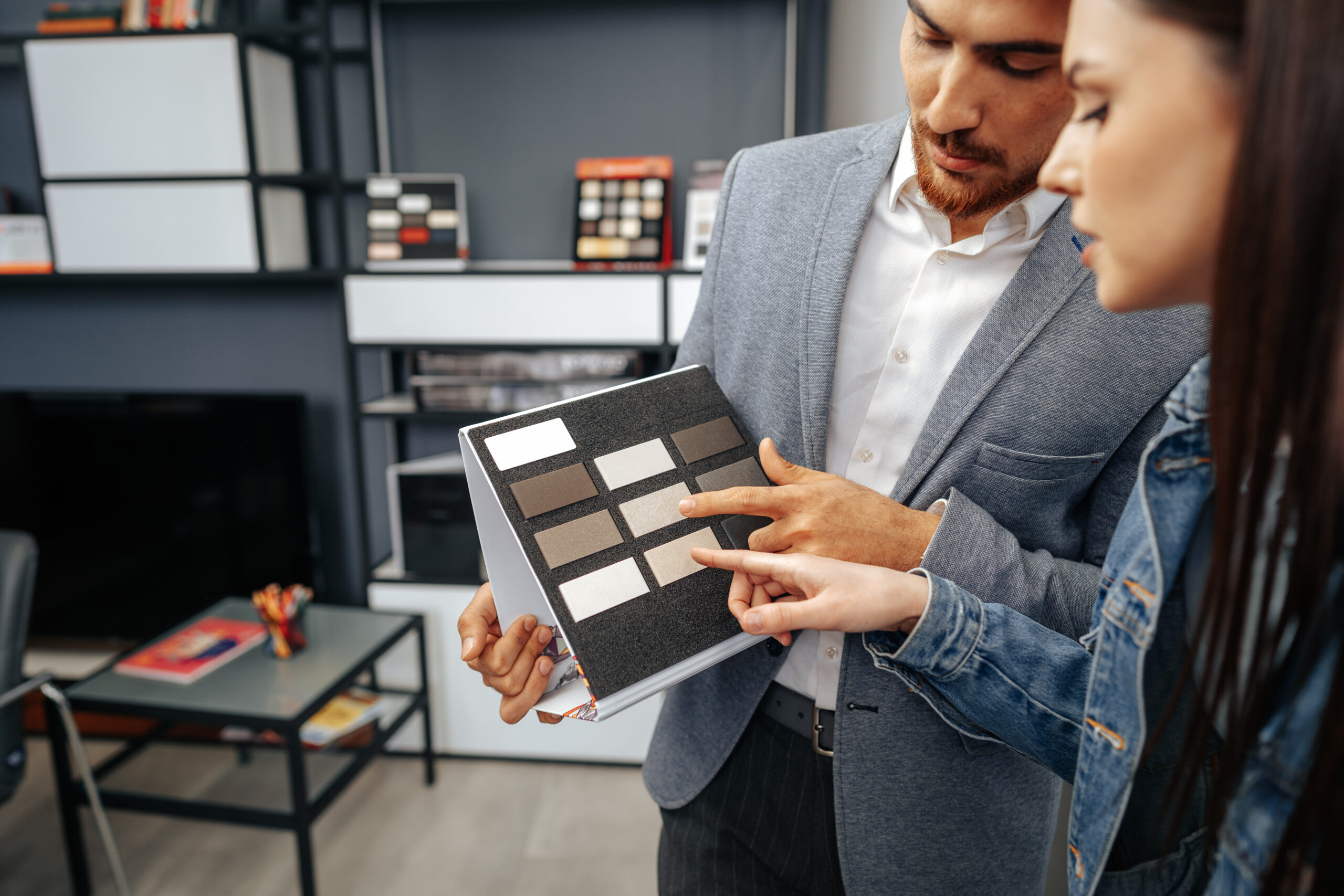Choosing the Right Corporate Interior Designer: Key Factors for Business Owners

Salesman shows color swatches to lady customer for new kitchen furniture close up
Designing or revamping a commercial space isn’t just about aesthetics—it’s about building an environment that reflects your brand, supports employee productivity, and impresses your clients. Choosing the right corporate interior designer is one of the most important decisions a business owner can make during this process. With the right professional on your side, you can transform your office into a space that enhances your operations and aligns with your business goals. In this blog, we’ll explore the critical factors you should consider when selecting a corporate interior designer for your business.
1. Understand Your Interior Design Goals
Before you begin your search, take time to outline your objectives:
-
Are you renovating or starting from scratch?
-
What is your budget?
-
Do you want an open-plan office, a hybrid setup, or executive suites?
-
Are you aiming for modern minimalism, luxury aesthetics, or functionality?
When choosing the right corporate interior designer, ensure they can translate your vision into a functional and visually appealing space.
2. Look for Relevant Experience
Not all interior designers specialize in corporate or office spaces. Look for professionals with a proven track record in commercial projects. An experienced corporate interior designer will:
-
Understand how to optimize space usage for productivity.
-
Be familiar with commercial building codes and safety standards.
-
Have knowledge of ergonomic furniture and lighting solutions.
-
Deliver designs that support team collaboration and employee wellbeing.
Ask to see a portfolio of their previous corporate work to evaluate their style and capability.
3. Check Credentials and Industry Certifications
Professional certifications and memberships with design associations add credibility. Look for:
-
CID (Certified Interior Designer) status.
-
Memberships in bodies like IIID, ASID, or IIDA.
-
Licenses, especially if your state or country requires them.
These credentials assure you that the designer is trained, ethical, and up to date with industry trends.
4. Evaluate Their Design Process
A structured design process indicates professionalism and efficiency. Ask potential designers:
-
How do they gather client requirements?
-
What are the steps from concept to completion?
-
Do they offer 3D renders or virtual walkthroughs?
-
How do they handle revisions?
A clear, step-by-step process ensures transparency and reduces the risk of delays or misunderstandings.
5. Assess Communication and Collaboration Skills
Interior design is a collaborative journey. Choosing the right corporate interior designer means picking someone who listens, understands your brand, and communicates effectively. During the initial consultation, observe:
-
Do they ask insightful questions?
-
Are they responsive to your ideas?
-
Do they suggest practical improvements without pushing their personal style?
Strong communication fosters a smooth working relationship and a design that truly represents your business.
6. Verify Project Management Capabilities
Office interiors involve timelines, budgets, vendor coordination, and often, tight schedules. Your designer should offer project management support or work alongside a team that can:
-
Handle procurement and contractor management.
-
Supervise on-site activities.
-
Ensure timely deliveries and quality control.
-
Manage unexpected issues without escalating costs.
An organized designer will keep the project on track and reduce stress for you as the business owner.
7. Ask for Client References and Reviews
Reputation matters. Ask the designer for references from previous corporate clients or read online reviews. When speaking to past clients, ask:
-
Was the designer professional and reliable?
-
Did they meet deadlines and stay within budget?
-
Were they flexible in addressing changes?
-
Was the final outcome aligned with the original concept?
Positive feedback is a strong indicator that you’re choosing the right corporate interior designer for your business.
8. Understand Their Design Aesthetic
While flexibility is key, every designer has a signature touch. Explore their portfolio to ensure their style aligns with your brand image. A good corporate designer can adapt, but it helps if their design taste resonates with your vision—whether that’s modern corporate chic, industrial, minimal, or biophilic.
9. Transparency in Pricing and Contracts
A reliable interior designer will offer transparent pricing and a clear contract. Before signing, confirm:
-
Their fee structure (fixed fee, hourly, or percentage-based).
-
What services are included and excluded.
-
Project timelines and payment milestones.
-
Terms for revisions and cancellations.
Clear financial agreements reduce the risk of surprises down the line.
10. Sustainability and Future-Proofing
Modern businesses are embracing sustainability not just for the environment, but to reduce long-term costs. When choosing the right corporate interior designer, find someone who:
-
Recommends eco-friendly materials and energy-efficient systems.
-
Designs with long-term adaptability in mind.
-
Plans for tech integration, modular furniture, and flexible layouts.
Sustainable and future-ready offices are both practical and brand-boosting.
11. Compatibility With Your Company Culture
Your office should reflect your company’s values and work culture. A designer who understands this will create a space that fosters your desired atmosphere—whether it’s high-energy creativity, formal professionalism, or laid-back collaboration.
For example:
-
A marketing firm may benefit from open collaborative zones and bold colors.
-
A legal firm may need quiet, private offices with an elegant, formal touch.
The right designer will align your space with your cultural and functional needs.
12. Post-Completion Support
Design doesn’t end when the paint dries. Great interior designers offer post-completion services such as:
-
Snag-list reviews.
-
Assistance with warranty claims.
-
Furniture or accessory reordering.
-
Guidance on space usage or minor tweaks.
Choosing a designer who offers ongoing support ensures that your investment remains in top shape.
Final Thoughts
Your office interior is more than just a physical space—it’s a tool that can inspire employees, attract clients, and enhance your brand’s identity. Choosing the right corporate interior designer is a decision that demands thoughtful consideration of expertise, style, professionalism, and compatibility with your goals.
By following the factors outlined above, you’ll be better equipped to select a designer who can turn your vision into a stunning and efficient workspace. Remember, the right designer won’t just decorate your office—they’ll help design your business success.


